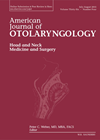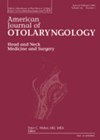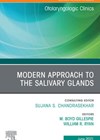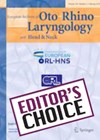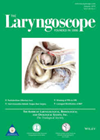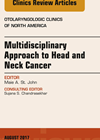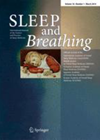
Journal Reviews
Does transoral robotic surgery improve outcomes among patients with head and neck cancer of unknown primary?
A tonsillectomy and tongue base mucosectomy is becoming increasingly accepted as the optimal surgical intervention to aid in identifying the primary source of a p16+ / HPV-related squamous cell carcinoma (SCC) of unknown origin, given that this disease almost exclusively...
Gastrostomy tube dependence following TORS
Transoral robotic surgery (TORS) for oropharyngeal squamous cell carcinoma (OPSCC) is now a well-established treatment modality for early (T1-T2) disease. Accumulating evidence suggests that one of its main benefits relative to conventional chemoradiotherapy is superior long-term functional outcome, especially with...
Is there a limitation for excising parapharyngeal tumours transorally?
The parapharyngeal space is a complex anatomical space bounded medially by the oropharynx and laterally by the mandible. It is conceptualised as an inverted pyramid extending from base of skull above to the hyoid bone below. The space is divided...
Outcomes for transoral vestibule approach thyroid surgery
Ed’s choice explores a systematic review examining one of the recent innovations in head and neck surgery. It may come as a surprise to some that within a few years of the first published cases of transoral vestibule thyroidectomy, an...
Which da Vinci surgical system? Novel flexible, single-port versus current multiport, rigid-arm robotic surgical system
The da Vinci robotic surgical system has transformed how oropharyngeal head and neck surgery can be delivered. The existing da Vinci Si model has challenges: the dimensions of this are larger than would be ideal for head and neck surgery...
Advances in surgical innovation for head and neck cancer
This article reviews current advances in surgical treatment of head and neck cancers such as sentinel node biopsy, stereolithic modelling, transoral robotic surgery and intra-operative imaging of tumour margins. Sentinel node biopsy has been found to be especially useful for...
Outcome of TORS to tongue base and epiglottis in patients with OSA intolerant of conventional treatment
The use of transoral robotic surgery (TORS) in ENT is rather controversial, but the use of robotic surgery for obstructive sleep apneoa (OSA), makes it doubly so. Previous studies on TORS in OSA have been performed with other types of...
In the future there will be robots
This edition of review articles encompasses the emerging techniques of robotic surgery, written by international experts from centres that are increasing their repertoire of procedures. The treatment of oropharyngeal cancer is challenging irrespective of modality, as oncological and functional outcomes...

